COP29 Concludes with Insufficient Action on Climate Finance and Nature Integration

COP29 ended with inadequate resolutions regarding climate finance and nature integration, with many stakeholders expressing disappointment. Despite its designation as ‘the finance COP,’ the conference neglected the urgent roles of nature in climate solutions, raising concerns heading into COP30 in Brazil. Ongoing advocacy for powerful climate policies remains essential, especially for vulnerable populations and ecosystems impacted by climate change.
The recent UN Climate Conference, COP29, which took place in Baku, Azerbaijan, concluded with a less than favorable outcome. Despite being characterized as ‘the finance COP,’ the negotiations were fraught with contention, ultimately leading to a deal that inadequately addresses the critical climate emergency and fails to support the most vulnerable communities and ecosystems. As policymakers reflect on the inadequacies of COP29, the focus now shifts to the upcoming COP30 in Brazil, where there will be renewed calls for urgent and meaningful climate actions that incorporate nature as a fundamental component.
During the two-week conference, disagreements over climate financing led to significant delays and protests, culminating in a final deal that many in civil society and various government representatives denounced. While the conference was intended to bridge existing financial gaps and elevate the role of nature in climate solutions, the lack of emphasis on these critical areas left many disappointed. As scientists continue to warn of the dire consequences of climate change, it becomes increasingly evident that nature must play a pivotal role in the collective response to the crisis.
Cathy Yitong Li, Senior Climate and Energy Policy Manager at BirdLife International, emphasized the necessity of protecting and restoring nature to mitigate the climate and nature crises effectively. However, COP29 failed to recognize this imperative, resulting in an agreement criticized for not addressing the intertwined issues of climate change and biodiversity loss adequately. As governments express the urgency of accelerating climate action, the inaction witnessed in Baku raises concerns for the future.
Despite the shortcomings of COP29, various actors, particularly in the private sector, are demonstrating a commitment to more ambitious climate strategies. Organizations like BirdLife International and its extensive network of partners are actively engaged in conservation efforts worldwide, reinforcing the importance of integrating nature into national climate policies. Looking ahead to COP30, there remains hope that governments can collaborate effectively to champion an interconnected approach toward climate and nature action.
The outcomes of COP29 underscore a critical need for governments to recognize the urgency of the climate crisis, particularly concerning the most affected populations. Young people are poised to inherit the consequences of delayed actions, witnessing increasing environmental instability, food scarcity, and heightened vulnerabilities. The implications of this conference extend beyond the immediate, as they shape the environmental legacy for future generations.
Particularly for nations in Africa, which contribute a mere 4% of global emissions yet suffer disproportionately from the adverse effects of climate change, the emphasis on nature-based solutions is paramount. The integration of nature into discussions surrounding climate finance and adaptation strategies is not merely an environmental issue but a matter of survival for many vulnerable communities. To effectively address the intersections of climate change, biodiversity loss, and social equity, concerted efforts to embed nature within climate strategies are essential.
The UN Climate Conference, or COP29, took place in late 2023 and aimed to address pressing issues related to climate finance, a critical component in combating the climate crisis. Delegates from around the world gathered in Baku, Azerbaijan, to negotiate agreements intended to secure funding for climate actions and enhance global cooperation. Throughout the negotiations, disputes over financing, the need for urgent climate action, and the role of nature in mitigation strategies were significant points of contention. The outcome of these negotiations has significant implications for future climate policy, particularly in light of the 2025 Climate COP expected to be hosted in Brazil, which represents a crucial opportunity for advancing global climate goals.
The results of COP29 highlight a stark need for a more integrated approach that recognizes the critical role of nature in addressing climate change. While the conference outcomes fell short, it is imperative that governments and organizations continue advocating for ambitious climate strategies that prioritize ecological integrity. The future of the planet and the resilience of vulnerable communities rely on the collective commitment to actionable solutions that bridge the divide between climate action and ecological preservation, particularly in preparation for COP30 in Brazil.
Original Source: www.birdlife.org






